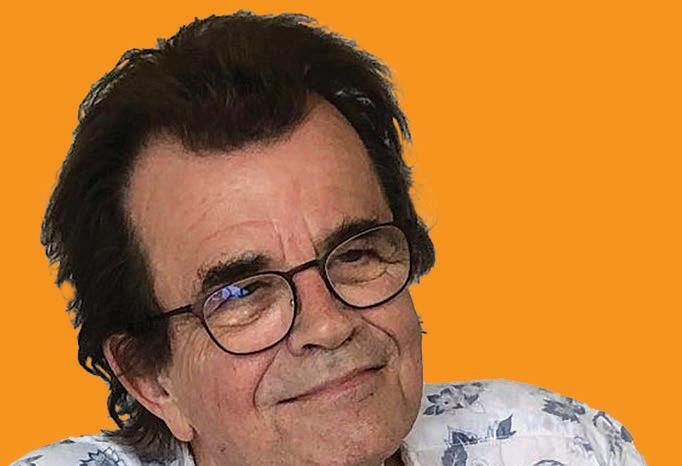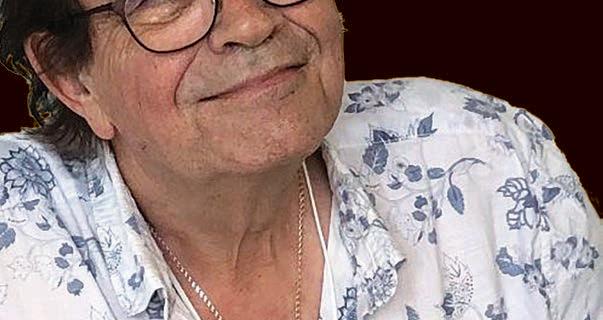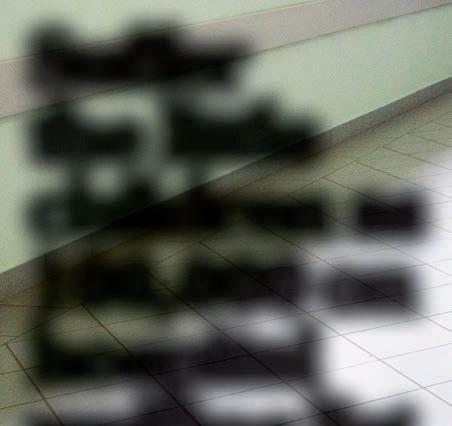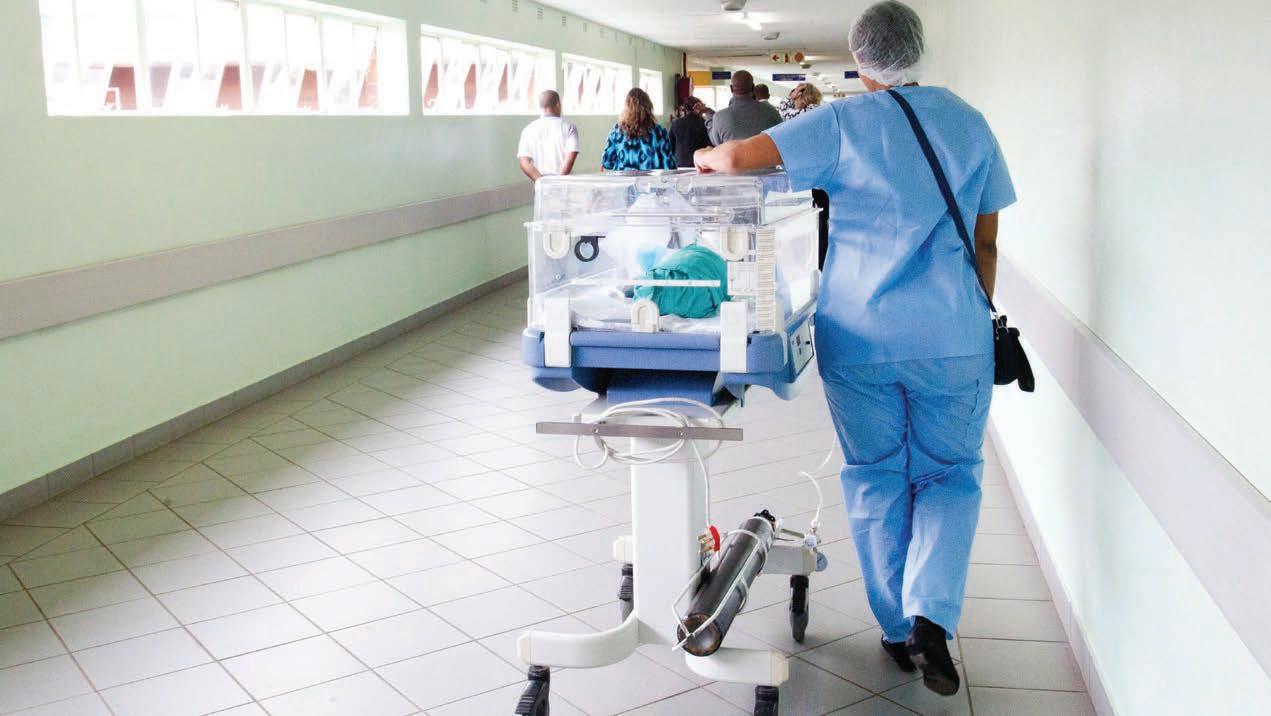
12 minute read
Paul Hopkins
The Fact OfThe Matter

Advertisement

PAUL HOPKINS PAUL HOPKINS We are hurtling towards, yet, another year
It seems like it was only yesterday that I wrote elsewhere, Where did that year go, what with 2021 just upon us? Now, here I am again, wondering where the last 12 months went? I may not be any the wiser but I am, unfortunately, another year older and it seems, with each passing year, time ies at an alarming pace.
My wonderful daughter said to me recently regarding some topic or other, You know dad, in a years time I will be 40!
And I said, You know Niamh, I was 40 only yesterday...
Of course I was 40 a score and more years ago: it just seems like yesterday. And if you, dear reader, are of similar vintage you will know exactly what I mean.
When you are young, time passes quite slowly. Each birthday is a monumental occasion. ose long lazy summers of childhood seem to never end. We, perhaps, remember trying to make the clock hands move faster with our minds as we sat bored in class. But as we grow older, life seems to speed up. Birthdays we’d sooner forget about, rather not notice them, as we feel like we’re hurtling towards old age. Why does it feel like this? Is time really moving faster somehow?
Research from the University of Kansas suggests a thorough study to understand this phenomenon, of time going faster as we get older. Scientists tested the theory, rst proposed by the contemporary physicist and philosopher Douglas Hofstadter, that time appears to speed up because we start grouping distinct individual experiences into larger ‘chunks’, like all our Christmases into one. When we are young we have many big moments, experienced for the rst time. So going to a park can be quite a big deal, with many memorable sensations experienced. But, as you grow older, going to that park o ers fewer and fewer new experiences. So, we start collapsing them into memory ‘chunks’, putting everything that happened simply under ‘a walk in the park’ — making that particular span of time feel brief. At least that’s Hofstadter’s contention. e Kansas study involved 107 volunteers who were asked to compare how events of the past year measured up to events of other years. Some of them were encouraged to group together, or ‘chunk’, their experiences, others to write down how events could have turned out di erently — going against the ‘chunking’ impulse. e chunking group found their previous year passed quicker than the other group did. e researchers also asked 115 undergraduates to re ect on di erent daily activities either over the past day or the past year. ose who chose to ‘chunk’ the past year felt it had passed faster than those who ‘chunked’ the previous day.
Although I do my very best not to dwell on this inevitable aspect of life, I can imagine that, for many people of my vintage, perceiving life as rapidly slipping away can prove unpleasant and somewhat demotivating, psychologically harmful even which may in part explain mid-life depression for many people. Or, at the very least, a sense of nostalgia for things gone by, to which I put my hands up.
If guilty on that front, I nonetheless endeavour to live life, each day, in the ‘moment’. A kind of mindfulness, if you like, which seems to be all the buzz at the moment.
Living ‘in the moment’ seems to allow me to appreciate such moments more fully, creating meaningful memories. At the end of the day, these days, and particularly with the pandemic, I nd myself more often resensitised to the satisfaction of the simple things life o ers. Spring was never so vibrant but autumn does, most days, seem richly gold. Increasingly, I nd people are of abiding interest — observed on the street, overheard on the bus, down the pub of an evening. Small pleasures have greater meaning now; that pint, the walk by the mill, my friend’s just published book of essays, my daughter’s phone call...
In their own way, such simple things counteract life’s quickening pace.
At the end of the day, middle and old age, and the attainment of such, should be laudably embraced, for it is that time of life denied so many throughout the world for whom death comes calling early. at I have lived another year is a miracle in itself. May your New Year bring you all the good life has to o er.
Miracles even...

Survival tips for Christmas
CLAIR WHITTY
Christmas is not for everyone and as such, some of you might feel a bit of pressure with all the build-up to it. All the talk, all the ads, and all the music. It can get to you. And those of you that love Christmas can feel stress and anxiety too because you have so much to do to be prepared. Some of you will overindulge on food, sweets, or alcohol, your digestive system could end up needing support. Here are some survival tips to try.
Stressed: My favourite supplements for stress and anxiety are Bach Flower Rescue Remedy and Stressveda. Rescue Remedy is easy to use. You simply add a few drops to water and sip throughout the day. is is also brilliant to relax over excited-children and adults too! Stressveda is a one-a-day supplement that includes Ashwagandha and B vitamins, ideal for stress and anxiety. It can help with energy too.
Lacking motivation and Drive: Higher Nature Alert (Drive) is a supplement I have tried when my mood was low with a lack of energy and drive. I was dragging myself around with no real motivation. Higher Nature Alert” gave me a lift, improved my lack of drive, and helped with energy too. Worth a try if you feel like I did.
Energy Boost: When I need an energy boost, I think of iron, Floradix Liquid Iron is what I would choose. It tastes great and one bottle can do the trick and get me going again.
Overindulgence: A.Vogel Milk istle Complex - is is an ideal herbal remedy to have in your cupboard as it aids digestion, and helps to support the liver helping it to deal with the e ects of alcohol. It helps break down fats so you don’t feel so sluggish after the main meal.
Bloating: Try Salus Peppermint tea. It’s ideal to help with bloating, wind (comma) and atulence. It helps to digest food more e ciently and is pleasant tasting too.
Heartburn: Try a spoonful of bread soda in a glass of water. Or eat an apple to ease discomfort. Hubner liquid Silica is a great supplement to try. It helps relieve nausea, bloating, and heartburn.
I hope these tips help and that you have a happy Christmas and a happy New Year.
If you have any questions about anything at all we would love to have a chat with you.
Natural Health Store Market Cross Shopping Centre Kilkenny Phone: 056 7764538 Email: info@ naturalhealthstore. ie Shop online: www. naturalhealthstore.ie


Covid makes us a nation once again
BY CARMEL MULLANEY
----------------------------CHRISTMAS is one of the most special times of the year. It is an opportunity to celebrate with our nearest and dearest, and a time of reunion after months of separation as a result of the pandemic. is weekend, many of us will enjoy this much-needed distraction after one of the most challenging years of our lives. e people of the South East region have well and truly led by example in the nation’s ght against this virus that has claimed so many lives, and has disrupted everyday society. e resilience and resolve of everyone in Kilkenny, Carlow, Tipperary, Waterford, and Wexford needs to be commended and remembered.
When we urged the public to adhere to unprecedented restrictions during the third wave, you listened and acted, breaking chains of transmission, and saved lives in your community as a result.
We stepped up to the task when asked to register for our Covid-19 vaccines, and more than 90% of the adult population in the region signed up and got fully-vaccinated, saving so many lives once more. e production of a safe, e ective vaccine of this scale and in such a short space of time is one of the greatest public health successes of our lifetime. is success would not have become a reality without your collective response.
In addition to praising the actions of the public, I want to particularly mention our heroes on the frontline across all our public services, and the essential workers who kept crucial services open so we could all be safe and secure.
Two years of restrictions is a test of endurance we are not used to, but we all rose to the challenge, nonetheless. We cannot deny the fatigue and frustration felt by everyone, and this is naturally compounded by a lot of uncertainty, particularly as we closely watch the emergence of the Omicron variant of concern.
But despite this uncertainty, there is a lot we can do in our daily lives to stop this virus. e basic public health measures work, and my team and I have seen this across all settings over the past 20 months. ese include wearing a face mask, maintaining a social distance, washing hands frequently, avoiding crowded areas, reducing social activity and contacts, and ventilating social and work spaces. e Covid-19 vaccine and the booster programme has not only saved numerous lives in vulnerable settings, such as nursing homes and residential care facilities, but it has signi cantly reduced the number of cases and outbreaks in the community. Breakthrough infections with serious outcomes can still occur, so it is essential that we avail of our booster shot as soon as possible.
Amid the current high level of disease circulating in the community, and the emergence of the more easily transmitted Omicron variant, it is incumbent on us to ensure we look after others close to us. If you are feeling unwell, please do not socialise with others, isolate at home, and arrange a free PCR test immediately. If you have cold-like symptoms, a negative antigen test is not enough to rule out Covid-19. Assume it is Covid-19, isolate, and get a PCR test.
As we reach the end of 2021, you should be proud of everything you did to protect yourself and loved ones around you. And while there will be further challenges down the line, we can look back with a sense of achievement, and look forward to what we can achieve together in 2022. e Department of Public Health South East wishes you all a safe and happy Christmas, and we look forward to working with and for you in the New Year.
Dr Carmel Mullaney, is Director of Public Health, HSE South East



Su er the little children as 100,000 on hospital waiting list

ALMOST 100,000 children are now on waiting lists for specialist care which could have long-term consequences for their physical and mental health, a leading paediatrician has warned.
Dr Ike Okafor, a consultant in paediatric emergency medicine at Children’s Health Ireland at Temple Street, Dublin, said that a lack of access to paediatric and mental health specialists had led to children attending emergency wards across the public health system.
In a statement on behalf of the Irish Hospital Consultants Association (IHCA), he said that 97,387 children were currently on hospital waiting lists, with 37,725 waiting more than a year to receive care, including 27,725 who had been waiting for more than 18 months.
Among them were 2,948 children who were on waiting lists in September to be assessed by a psychiatric consultant with Child and Adolescent Mental Health Services, which had marked a six-year high. ere are 843 children who have been waiting for more than six months while 195 have been waiting more than a year.
He also said that there had been a 9% increase in the number of children presenting at emergency departments at Dublin’s paediatric hospitals in a mental health crisis.
“ e pandemic has led to a massive increase in children presenting with acute mental health problems, especially eating disorders and self-harm.
“A system that was already under pressure, not just in hospitals, but in the community, has suddenly gone into crisis mode,” he said. “Children are waiting longer and longer to see psychologists and psychiatrists and that’s a problem.
“Historically children’s health hasn’t been adequately funded in this country. We’re playing catch-up.
“All stakeholders need to come together to make healthcare better, more accessible and more equitable,” he said.
Dr Okafor said a longer wait for children to be seen by a specialist only exacerbated the problem.
“Children’s care can’t wait. No child should have to wait more than six weeks to get any kind of healthcare intervention.
“ e longer they wait, the more protracted their condition actually becomes.
Restaurateur with Covid says ‘No’ to cert check
A WEXFORD restaurateur who had to temporarily close after refusing to check Covid certs has said he has now contracted coronoavirus himself.
Luigi Perri, who runs the e Forge Restaurant and Pizzeria in Castlebridge, also said he would not check certs when he reopened, despite catching the virus.
Mr Perri last month launched an online fundraising campaign to ght the HSE, which he said was bringing him to court for refusing to check customers’ Covid certs. e campaign has already raised in excess of €17,500.
Mr Perri was recently hospitalised with Covid and had announced that the restaurant had had to temporarily close as a result.
He told the Sunday World that he would continue his policy of not checking Covid certs when he reopened.
“We will never bow to fascism,” he said. “I don’t understand why I should ask for the Nazipass, if it is absolutely not for the safety of people.
“My problem is the Nazipass. Do not discriminate against anyone. e Nazipass does not guarantee you that you do not have the Covid so I’ll never ask,” he said. e Auschwitz Museum have taken great issue with people linking Covid safety measures to the atrocities committed by the Nazis.








